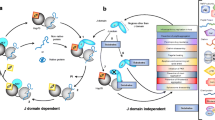Abstract.
J proteins are chief regulators of the Hsp70 family, a highly conserved family of ATPases that mediate conformational changes in a broad range of proteins. The J protein family has been the central focus of numerous prokaryote and eukaryote biologists. Common questions that arise include: How does the J protein/Hsp70 machinery support protein folding? What role do J proteins play in protein misfolding and neurodegenerative disorders? Can the J protein/ Hsp70 machinery be harnessed to provide a rational basis for recombinant protein production? The current progress that has resulted from the convergence of biochemistry with Escherichia coli and Saccharomyces cerevisiae genetics has accelerated the pace at which these questions are being elucidated. We are beginning to gain some insights into the neuronal network of J proteins. Here, we highlight recent advances in our understanding of how select J proteins harness Hsp70 s for fundamentally important conformational work in neurons.
Similar content being viewed by others
Author information
Authors and Affiliations
Corresponding author
Additional information
Received 20 February 2008; received after revision 14 March 2008; accepted 18 March 2008
Rights and permissions
About this article
Cite this article
Zhao, X., Braun, A.P. & Braun, J.E.A. Biological Roles of Neural J Proteins. Cell. Mol. Life Sci. 65, 2385–2396 (2008). https://doi.org/10.1007/s00018-008-8089-z
Published:
Issue Date:
DOI: https://doi.org/10.1007/s00018-008-8089-z




